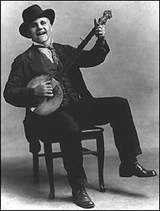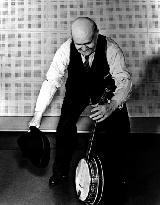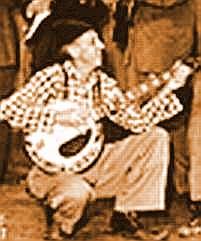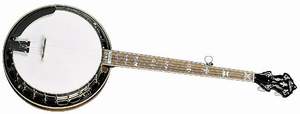Banjo Groundbreakers
With the banjo being associated with black minstrel shows in the late 19th century and early 20th
century, a stigma was attached to banjo players in general. There were a few banjoists
that broke new ground in bringing the banjo back to a mainstream America. These players
would be an impetus not only for repopularizing the banjo, but serve as forerunners of
new types of banjo music.
|
 SoundClip
SoundClip
Old Plank Road
Uncle Dave Macon
|
Banjo music continued to evolve during the early 20th century.
Better made banjos allowed for higher tunings. This led to
new innovations in playing a few banjoists molding the patterns that
many would soon follow.
While this record does not
cover every player, it does portray many of the better known ones.
With the success of Ossman and Van Epps in the early 1900s
came another to the list in the 1920s, Uncle Dave Macon.
Uncle Dave Macon was born David Harrison Macon at Smart
Station, Warren County, Tenn. on October 7, 1870,
and died March 22, 1952. Dave made his living for many years
in the freight business, driving teams of horses pulling wagons,
his business became endangered with the advent of new gas powered trucks
and his livelihood threatened.
At nearly 50 he
began his new career playing for a friends party who agreed to
pay him a sum of 15 dollars, alot of money in the 1920s.
His performance was so extraordinary, it led to many other
jobs for him and opened the gates of radio and recording
when those industries developed later in the 20s.
|
|
Macon was a superior performer, and entertainer, dancing and doing tricks
with his banjo while keeping the songs going. Coupled with an infectious
warm personality he achieved a great deal of success. In the new and
fledgeling arena of radio, his talents propelled him to great notoriety.
He played in the classic "clawhammer" or "knocking" style
as it is called, his style of playing the old way banjos were played.
|
Uncle Dave was the inspiration for many folks to pick up and play a banjo.
Uncle Dave played on banjos with resonators for most of his career.
He finally had Gibson custom-build an open back in 1940, which he played for
the rest of his time in show business. Strange banjo-fiddle headstock,
16 brackets, flat tension hoop, I suspect the open back was lighter
and easier for him to twirl and do his tricks with as he was performing
in his seventies at this time.
Uncle Dave joined the Grand Ole Opry in 1925 and appeared in
the movie "Grand Old Opry" in 1940. He toured with the Grand Ole Opry show
with Bill Monroe in the 40s. He was inducted into the
the Country Music Hall of Fame in 1966. |

|

Soundclip
Snuffy Jenkins
Cumberland Gap
|
Banjo music became popular in country music again in the 1920s with players such as Uncle
Dave Macon pushing the banjo for more. Soon a new style of playing
emerged, no one really knows who invented it, or if it was just
a natural progression. Two relatively unknown banjoists, Smith Hammett
and Rex Brooks are credited with teaching a new three fingered style
to a young man named Dewitt "Snuffy" Jenkins.
DeWitt "Snuffy" Jenkins was born in Harris,
North Carolina on October 27, 1908. In 1927 he played guitar in
a trio with banjo players Smith Hammett and Rex Brooks. Jenkins then picked up the banjo and
copied their three-finger style, from that point on it became his
first instrument. During this time he began mentoring the
young Earl Scruggs .
|
|
Jenkins relocated to Columbia, South Carolina in the spring of 1937,
soon joining a string band calling themselves The Hired Hands. This band
was to be Snuffys home for almost the next 50 years. They recorded
their first album in 1962 but it wasnt released until 1970 by Folklyric
and re released in 71 by Arhoolie. He also recorded for Rounder and
Old Homestead. Snuffy passed away April 30, 1990. He is often called a
Bluegrass Pioneer, but I think more accurately he was a banjo pioneer.
His pioneering the banjo eventually led to the Bluegrass sound created largely
by Bill Monroe because of Earl Scruggs.
Though Bill Monroe was a mandolin player, we have
to take a look at his band for he created and even coined
the term "Bluegrass Music".
|

Snuffy played on a Gibson RB4 made in about 1930.
|
MORE ABOUT
|

